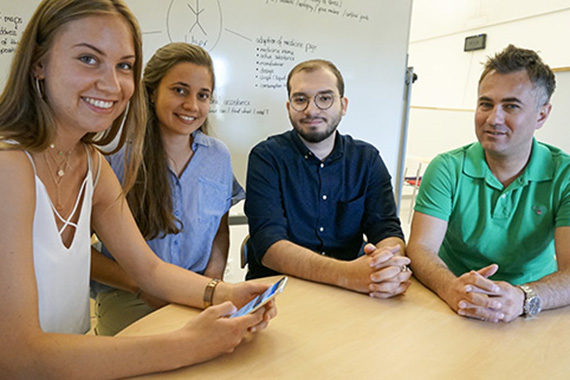EldHelp gives the elderly independence in their everyday life
Calendar, map and contacts – by just pressing a few buttons. Four computer students from Kristianstad University have now developed the all-in-one app EldHelp, which supports the elderly and facilitates their daily life.

Students Paulina Wittich, Hannah Kern, Abdulrahman Alassadi and Fatih Sayilir hope that EldHelp will make it less daunting to grow old.
How are you today? The question appears on the mobile screen, and by choosing a happy symbol, the user indicates that everything is fine. The encouraging response comes quickly: Great!
However, if the user presses a sad symbol, contact information appears for their nearest family member or an emergency number. This daily status report is one of many features of the EldHelp app, which has been developed by four students on the Software Engineering course. The idea came about in conjunction with ToY Imagine at the end of March, when computer scientists and nurses met to discuss innovations within healthcare. The group began to talk about the demographic changes in society.
–There is an increasing number of elderly people in society, and many of them feel lonely and at the same time dependent on others. The app is a way to give them back their independence, says Paulina Wittich.
After reading a series of scientific articles and studies on the needs of the elderly, the students began to design a simple contact list. Using the list, the user can call family members or an emergency number with the push of a button. Then the medication calendar was added, which reminds the user to take the right medicine at the right time.
Since then, more and more features have been added. A simple calendar shows what is happening day by day, and if the user should go outside and get lost, a digital map can easily show the way home.
–You could say that the app is all-in-one, says Abdulrahman Alassadi in summary.
Initially, the group thought a lot about whether the elderly could really handle the technology.
–But we have read studies showing that today's senior citizens often have no problems using smartphones. My grandmother, who is 70 years old, has tested it and thinks it works great, says Hannah Kern.
The next step is to enable doctors to send direct information about prescriptions and medication to the user's mobile.
–It saves a lot of time. I have an elderly relative who has had health problems and has made several trips between doctors and pharmacies before finding the right solution. It would have been much easier if the doctor had sent all the information directly via the app, says Fatih Sayilir.
With limited steps, clear symbols and large text, older people will be able to handle the app. One hope is also to offer a voice function that can read written text.
The students note that much work remains to be done and that new ideas emerge as they go. Next semester, parts of the group will have the opportunity to continue developing the app. Marijana Teljega, a teacher on the Software Engineering course, and her colleagues Kamilla Klonowska and Nazila Hasanzade have followed their work closely.
–It's been an interesting process to watch the emergence of the app. I definitely think it will be useful in the future.
